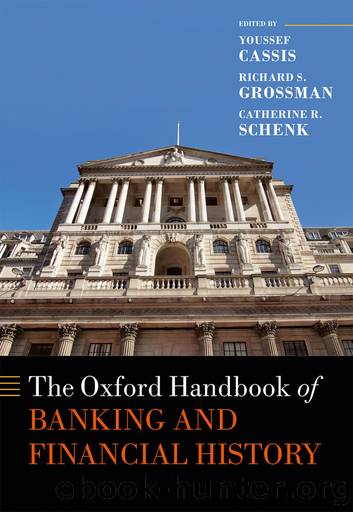The Oxford Handbook of Banking and Financial History by Youssef Cassis;Richard S. Grossman;Catherine R. Schenk;

Author:Youssef Cassis;Richard S. Grossman;Catherine R. Schenk;
Language: eng
Format: epub
Publisher: OUP Premium
Published: 2016-11-15T00:00:00+00:00
CONCLUSION
The nature and role of securities markets long differed between countries not only because of income levels but as a product of a different historical experience. Nevertheless, there are many common features in the way that securities markets have developed over time. Though of less obvious utility compared with banks, securities markets have long made an important contribution to the global financial system, both at the international and national level. However, this contribution is often missed because securities markets are analysed solely from the perspective of those who issued stocks and bonds, whether they were governments or companies. Of equal importance were the needs of investors and it was with these that the development of stock exchanges was most closely aligned over the centuries. It was for that reason that securities markets first made their most important contribution to the financial systems of the most developed economies but only from the era of the Industrial Revolution onwards. It was only slowly that securities markets began to play an important role in less developed economies because the absence of a large number of investors reduced both the incentive to issue securities and the volume of activity necessary to support the cost of the organized exchanges. Without stock exchanges securities lacked the certainty of a market in which they could always be bought and sold, which greatly reduced their appeal to investors. Beginning in Western Europe and the US, the establishment of stock exchanges, and the continuous refinement of their rules, regulations, and trading facilities, made securities superior to all other types of assets as they combined moneyâs attributes of being a means of exchange and a store of value with the returns promised by a loan or an investment. The result was to make securities markets central to the operation of the global economy on the eve of the First World War, with nothing on the horizon that threatened their continued growth and expansion.
What could not be predicted was the devastating effect two world wars, separated by an international financial crisis and a global economic depression, would have on securities markets. Stock exchanges made easy targets for governments seeking to control the operation of financial systems, both internally and externally, and were obvious scapegoats for the public in the search for causes of crises and economic collapse. For that reason the positive contribution that securities markets could make to financial systems remained unrecognized for many decades after the end of the Second World War. It was only as a result of pressure from investors and the needs of both governments and business that securities markets staged a revival from the 1970s onwards. That took a new form as it incorporated the major advances in technology, business organization and the enhanced role of governments that had taken place in the intervening years. It was for those reasons that in the securities markets that developed in the late twentieth century there was a much reduced role for stock exchanges compared to the global banks that became their major users.
Download
This site does not store any files on its server. We only index and link to content provided by other sites. Please contact the content providers to delete copyright contents if any and email us, we'll remove relevant links or contents immediately.
HBRâs 10 Must Reads for Executive Teams (with bonus article âLeadership That Gets Resultsâ by Daniel Goleman) (for True Epub) by Harvard Business Review(452)
Python for Finance Cookbook by Lewinson Eryk;(437)
Empowering Public Speaking by Deanna L. Fasset & Keith Nainby(402)
Doing business with Japan : successful strategies for intercultural communication by Kazuo Nishiyama(384)
Global Orders and Civilizations : Perspectives from History, Philosophy and International Relations by Sadik Unay; Muzaffer Senel(311)
Engaging with Ethics in International Criminological Research by Michael Adorjan Rose Ricciardelli(274)
Analysis of Financial Statements by Frank J. Fabozzi & Frank J. Fabozzi(252)
The Future Internet by Bernard Marr(251)
Intentional Power: The 6 Essential Leadership Skills For Triple Bottom Line Impact by Lisen Stromberg & JeanAnn Nichols & Corey Jones(247)
The Three Skills of Top Trading by Hank Pruden(244)
The Economics of Banking by Jin Cao(241)
Entrepreneurial Marketing by unknow(235)
Focus on Teaching by Jim Knight(226)
The Oxford Handbook of Banking and Financial History by Youssef Cassis;Richard S. Grossman;Catherine R. Schenk;(224)
Building a Career in Cybersecurity: The Strategy and Skills You Need to Succeed by Yuri Diogenes(214)
Data Science and Analytics for SMEs: Consulting, Tools, Practical Use Cases by Afolabi Ibukun Tolulope(213)
Financial Statement Analysis by Martin S. Fridson;Fernando Alvarez; & Fernando Alvarez(211)
New India by Arvind Panagariya(209)
Maximum Success with LinkedIn by Dan Sherman(186)
